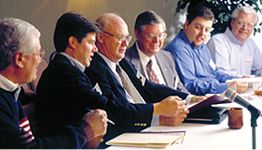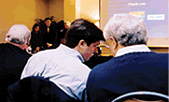 |
|||||||||||||||||

|
|
To pass this test, graduating business seniors must learn to combine their own accumulated schooling with the knowledge amassed by a team of their peers. Each team member approaches the group from the perspective of his or her chosen business discipline. Suddenly, finance students are forging relationships with human resources, marketing and technology students to achieve a common goal — winning the integrated business case competition in their Business Policy capstone course. For some students, it is their first realization of what it is like to work with a diverse business group — not just a traditional class of like-minded majors. Therein lies the challenge. "There is a steep learning curve for students once they form their teams," says Derrick D'Souza, associate professor of management and one of the coordinators of the competition. After receiving a business scenario, approximately 40 groups of students, the academic equivalent of consulting firms, analyze the case and develop recommendations and implementation strategies. These scenarios, such as maneuvering the growth of a small-size company to a medium-size company, transforming a word-of-mouth campaign into a sophisticated marketing presence or redesigning a country club's business plan, aren't outlined in textbooks. The cases are real and the companies behind them are listed in area yellow pages. "There are relevant cases in the community from which these students can develop strategy," says D'Souza, and business representatives benefit from hearing the students' recommendations.
Reinventing case studies The competition's interactive focus distinguishes it from similar ventures at other institutions. Rarely do students get the chance to meet the company behind a book case study. "This is a well-thought-out model for learning," says Joe Brouillette, an executive with Accenture and an annual judge of the final competition. "It represents real life." A live case study adds a sense of ownership — it goes beyond being homework. After a 20-minute presentation by a team of students, a company executive has a 10-minute opportunity to pose questions. "The question-and-answer session is especially important," says Grant Miles, assistant professor of management and another of the competition's coordinators. "It is not a prepared script like the presentation." Many students have not had much experience with public speaking or with defending their recommendations. Interacting directly with a company executive helps them think on their feet and sell their analysis, Miles says. The live case study also allows for personalization of a team's recommendations. "We were in tune with the owner's personality and responded accordingly," says Cheryl Taylor Pruden ('99), a human resources graduate. "We may not have made the same recommendations to someone in a book."
Mutually beneficial "Students give frank feedback to companies," says D'Souza. "But the good part is that they tend to think outside the box." Several teams recommended that Dowdy Anderson & Associates diversify its practices. The small engineering firm concentrated on single-family development, which can be cyclical. John Baum, general manager, says his company now is entering municipal development as well. "This can be a real eye-opener for senior executives making important decisions," says Baum. Joan Hayne, owner of Hayne Corp., an air filtration company, agrees. "Their generation brings excitement, creativity and technology," she says. "Among other things, they helped eliminate my doubts about having a web site. I am still feeding off of their recommendations." Students and companies both receive exposure, and this can help trigger recruiting. "It gets your company name out there in the college circle," says Tim Koressel, general manager of a Club Corp. country club. "Everybody needs quality employees, and there are good employees coming out of North Texas."
Learning to work together Most importantly, a case study helps students learn teamwork — a skill for which employers look. The integrated business case competition broadens students' perspectives and helps them to see how issues affect every area of a business. "I tend to look at things strictly on a financial basis — the bottom line," says accounting graduate Brenda Killion ('00). "My team members were able to show me the value of spending money when necessary." Thus, students learn to rely on each other's expertise to create workable solutions. Collin Berg ('99), a real estate graduate, explains the development of his team's recommendations: "Each of us with our different majors had more information on certain topics. It was interesting to hear all the ideas and see how everything came together."
Reality check Because the competition simulates real-world experience, the scenarios are kept secret until the end of the semester when the two-week competition begins. "In a business situation, you may be given a week, a day or a stay-until-it's-done time frame within which to work," says Miles. "You aren't always given a lot of leeway." This condensed time frame brings out the best in students who know what it takes to become successful business leaders, including knowing when to put in overtime. "We spent plenty of late hours," says Bryan Sherman ('00), a finance graduate. "We opened the computer lab, and we closed the computer lab. "Basically, our team became like a small family that semester."
Team teaching Companies are chosen as case studies one or two semesters prior to the competition. Faculty members work with the businesses to develop comprehensive scenarios that cover all disciplines. "Very few schools offer this type of class because it is very time intensive," says D'Souza. "It requires a large amount of collaboration among all faculty." But the work pays off. The faculty members who judge the initial rounds of competition receive valuable feedback during team presentations. They discover firsthand if their curriculum has been effective. "They go back and think about how they're preparing students," says Miles. "This competition has brought more people together than anything else in the College of Business Administration." In the end, the students benefit the most. "Compared to everything else," says
entrepreneurship graduate Scott Jamison ('99), "this competition
was by far the most realistic experience I had in school."
 |
||||||||


